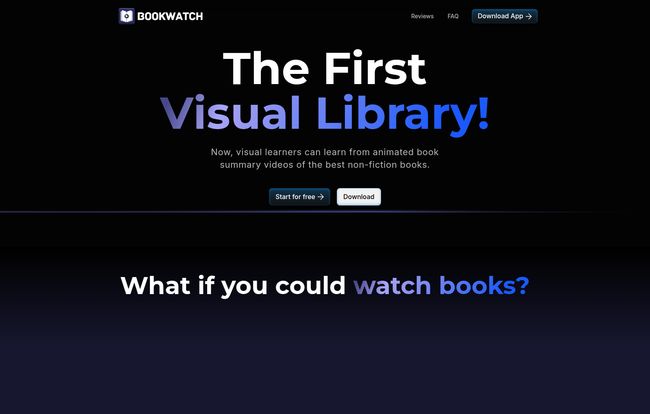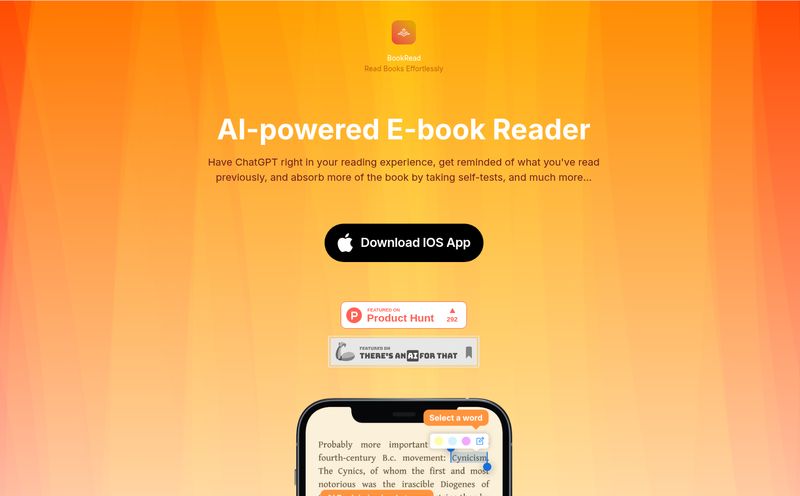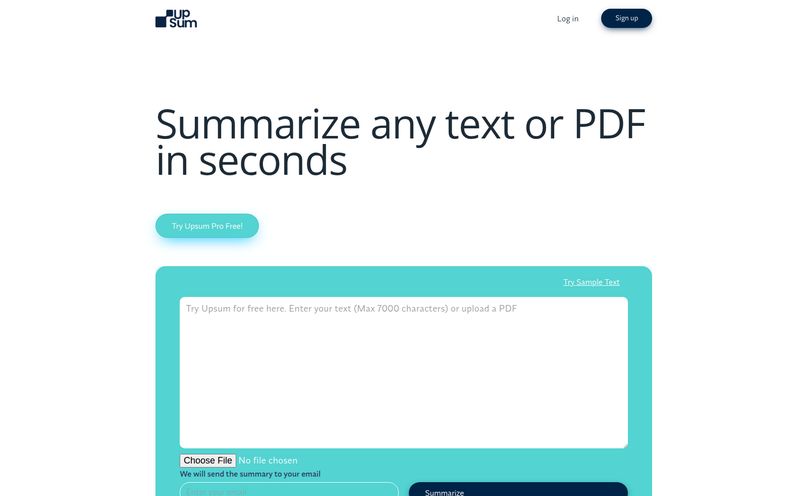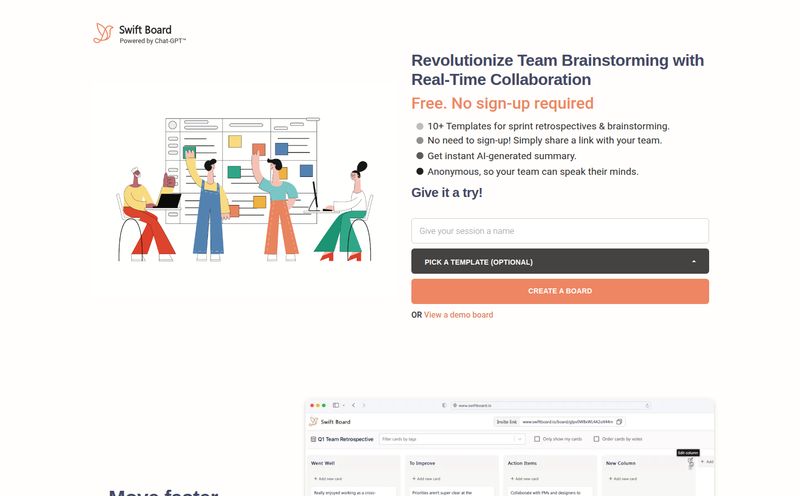My Kindle library is a graveyard of good intentions. It’s filled with all those brilliant non-fiction books I swore I’d read—the ones about business strategy, productivity hacks, and behavioral psychology. They sit there, gathering digital dust, silently judging me. Every so often, I open one, read a page and a half, and then… squirrel! A notification pops up, an email needs answering, or I just remember I haven't checked TikTok in a whole seven minutes.
Sound familiar? As someone who has spent years in the fast-paced world of digital marketing and traffic generation, I know that attention is our most precious and depleted currency. The trend is undeniable: we're moving away from massive blocks of text and toward short-form, visually stimulating content. It’s not that we don't want to learn; it's that the way we consume information has fundamentally changed.
So when I stumbled upon a tool called BookWatch, the tagline alone made me stop scrolling: "The First Visual Library." The proposition was simple and, frankly, a little audacious: What if you could watch books? I was skeptical, but intrigued. Could this really be the answer for us visually-wired, time-crunched folks?
So, What Exactly is BookWatch?
At its core, BookWatch is a mobile app that uses AI to transform popular non-fiction books into engaging, animated video summaries. Think of it like a high-quality YouTube explainer video, but for an entire book like 'Atomic Habits' or 'Thinking, Fast and Slow'. It’s designed from the ground up for people who learn better by seeing and hearing rather than just reading. It's a library, but instead of pages, you get play buttons.
The testimonials on their site are full of people saying it's been a game-changer for their ADHD or that it finally makes absorbing business concepts feel less like a chore. That caught my eye. This isn't just about speed; it's about accessibility.
My First Impressions (And Why I Was Skeptical)
Okay, I've been around the block. The book summary space is crowded. We've got Blinkist, Headway, and a dozen others. My initial thought was, "Oh great, another summary app." Most of them just give you a text summary or a dry, robotic audiobook reading. Useful, maybe, but rarely enjoyable.
But BookWatch feels different. The moment I fired up my first summary, I got it. This wasn't just text on a screen. It was motion. It was little characters and graphs moving around to illustrate a point. It felt less like I was doing homework and more like I was watching a cool educational short. It turns the passive act of listening into an active experience of watching.

Visit BookWatch
The Good Stuff: What BookWatch Gets Right
After spending some time with the app, a few things really stood out. This isn't just a gimmick; there's some real substance here.
A Godsend for Visual Learners
I’ve always been a visual learner myself. Give me a whiteboard and a marker over a textbook any day. BookWatch leans into this hard. Instead of just telling you about a complex framework from a business book, it shows you. The animation helps connect abstract concepts to concrete images, which is a proven way to improve memory retention. It's like having a personal animator who's really good at explaining things break it all down for you. It's the movie trailer for the book, and sometimes that's all you need.
Seriously, It Saves So Much Time
The average non-fiction book can take 6-10 hours to read or listen to. A BookWatch summary? About 10-20 minutes. That's a staggering difference. Now, am I saying it's a complete replacement? Not exactly, and we'll get to that. But as a content triage tool, it's incredible. I've already used it to quickly get the gist of three books that have been on my list for a year. I realized one of them wasn't for me at all (saved me 8 hours!) and decided another was so interesting that I immediately bought the full audiobook. It helps you invest your time more wisely.
Engaging and Actually... Fun?
Yeah, I said it. A learning app that's fun. The animations are clean and keep your eyes moving, making it hard to zone out. Plus, they've baked in some light gamification with personal challenges and achievements. It gives you that little dopamine hit of progress, which is more than I can say for my poor, neglected Kindle library. It's a smart way to encourage consistent learning.
Let's Be Real: The Not-So-Perfect Parts
No tool is perfect, and it would be disingenuous to pretend BookWatch is the exception. To be a credible source, you gotta look at the whole picture.
You're Getting the CliffsNotes, Not the Novel
This is the big one. An animated summary, by its very nature, is going to miss the nuance, the detailed case studies, and the author's unique voice. You get the skeleton of the idea, but you miss the soul. I would never use BookWatch to, say, write a research paper. But for getting the main takeaways of a popular business book to sound smart in a meeting? Absolutely.
It's an App-Only Experience (For Now)
As someone who spends most of my day chained to a laptop, I was a little bummed there isn't a web or desktop version yet. It's only available on the App Store and Google Play. This makes sense for its on-the-go, bite-sized consumption model, but I'd love the option to watch on a bigger screen. Maybe that's in the pipeline.
The Question of Cost
BookWatch operates on a subscription model after a free trial period. The website is a bit shy about listing the exact price—a classic marketing tactic to get you in the door (or in the app, in this case). You'll have to download it and start the trial to see the current pricing tiers. So, it's not a free-for-all; it's an investment in your learning.
Who is BookWatch Actually For?
So who should hit that download button? In my professional opinion, the ideal user fits into a few categories:
- The Busy Professional: The entrepreneur or manager who needs to stay current on business trends but simply doesn't have 10 hours to spare for every new bestseller.
- The Visual Learner: Anyone who's ever found themselves doodling in the margins of a book to understand it. If you prefer YouTube explainers to Wikipedia articles, this is for you.
- The Lifelong Learner with ADHD/Dyslexia: The testimonials speak for themselves. The engaging, multi-sensory format can be a massive help for those who struggle with long blocks of text.
- The Curious Book Hopper: The person who wants to know a little about a lot. You can bounce from a book on marketing to one on ancient philosophy in under an hour.
BookWatch vs. The Competition
How does it stack up against an app like Blinkist? It's a different beast entirely. Blinkist is for readers and listeners. It's efficient, text-based, and audio-focused. BookWatch is for watchers. The core differentiator is the medium. It's not just a different presentation; it's a different learning experience. Choosing between them comes down to a simple question: Do you prefer to read, listen, or watch?
My Final Verdict: Is BookWatch Worth Your Time?
After a healthy dose of skepticism and a few weeks of use, I'm a convert. But with a caveat. BookWatch is not a replacement for deep, immersive reading. It just isn't. And that's okay! It's not trying to be.
What it is, is a brilliant supplement. It's a digital espresso shot of knowledge. It’s a powerful discovery tool that respects your time and caters to the way many of our brains are now wired. It successfully bridges the gap between old-school knowledge and new-school media consumption.
If you're like me, with a bookshelf full of ambition and a schedule full of reality, I genuinely think you should give it a shot. The free trial makes it a no-brainer. You might just find it's the learning hack you've been waiting for.
Frequently Asked Questions about BookWatch
What are BookWatch's animated summaries?
They are short (usually 10-20 minute) videos that use animation and voiceover to explain the key concepts and main ideas from popular non-fiction books. It's designed for a visual learning experience on your phone.
Is BookWatch free to use?
BookWatch offers a free trial so you can test it out. After the trial period, it requires a paid subscription for full access to their library of animated summaries.
Can I use BookWatch on my computer?
Currently, BookWatch is a mobile-first platform and is only available as an app for iOS (App Store) and Android (Google Play). There is no desktop or web version available at this time.
Does this replace reading the actual book?
In my opinion, no. It's a supplement, not a replacement. The summaries are fantastic for grasping the main arguments and deciding if a book is worth a deeper dive, but they don't capture the full depth, stories, or author's voice of the original work.
Who would benefit most from BookWatch?
It's especially powerful for visual learners, busy people with limited reading time, students, and individuals with learning preferences or conditions like ADHD that make reading long texts a challenge.
How can I cancel my subscription?
Like most app subscriptions, you would typically manage and cancel it directly through your phone's App Store (for iPhone) or Google Play Store (for Android) subscription settings.



